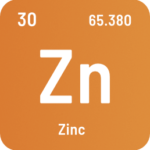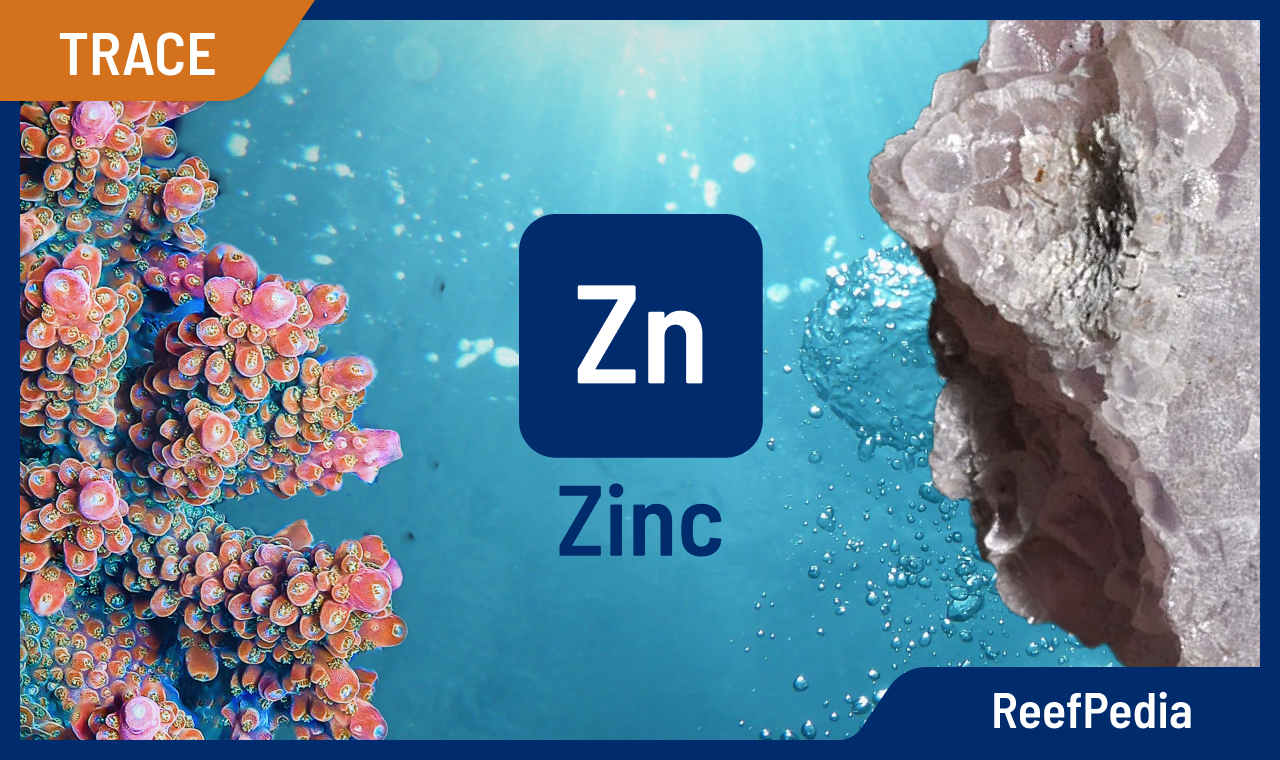Table of Contents

What is ZINC (Zn)?
Zinc (Zn, Latin: zincum) is an element belonging to the group of transition metals*, located in the twelfth group of the periodic table. Zinc is a brittle metal with a bluish-white color. It is mainly found in the Earth’s crust in the form of minerals, with the most important ones being zinc blende and smithsonite. Zinc forms numerous chemical compounds, in which it is primarily present in the +I and +II oxidation states.
The importance of zinc (Zn) in seawater
In the aquarium hobby, zinc is commonly considered a “curse” for marine aquarium enthusiasts. This designation primarily stems from metal components (often impellers) in contact with seawater, which can be a common cause of uncontrolled excess zinc in the aquarium. When interpreting the results of elemental analysis (ICP-OES), one of the first microelements you’ll likely check is zinc. Its harmful effects on marine organisms become significant at higher zinc concentrations.
However, zinc is an important and essential trace element influencing several physiological processes in marine aquariums. It takes part in enzymatic, regulatory, structural, and oxygen processes, making it a necessary trace element. It also affects the coloration of corals. Its level should be maintained in the recommended range of 2 – 5 µg/L.
The role of zinc (Zn) in marine aquariums
Zinc is important as a trace element in seawater, primarily in areas such as:
Biological processes (enzymatic processes)
Zinc is an important element for corals and the broader biology of the aquarium. It’s a component and cofactor (chemical compounds necessary for enzymes to catalyze specific chemical reactions) for many enzymes that play a crucial role in the metabolic cycles of corals.
Regulatory processes
Zinc is important for the structural regulatory system in bacterial cells. Scientific studies show that zinc plays a role in biofilm formation. This element also regulates the movement of bacteria.
Building processes
Zinc is especially important for creating healthy biofilms. It also plays a role in tissue regeneration and stimulates coral growth. The lack of zinc disrupts nutrient cycles.
Oxygen processes
The presence of zinc in seawater is important, especially for heavily illuminated aquariums. Zinc plays a crucial role in regulating oxygen processes, protecting corals from excessive illumination emitted by lights. The right concentration of zinc limits the expulsion or movement of zooxanthellae within coral tissue.
Coral coloration
Zinc also influences many processes related to the coloration of corals; it is necessary for creating proteins that contribute to color pigmentation. Additionally, zinc contributes to the formation of fluorescent protein plates responsible for fluorescence.
Problems with zinc (Zn) deficiency and application in seawater
Zinc belongs to a group of elements that are directly related to each other. This group also includes nickel (Ni), vanadium (V), copper (Cu), and molybdenum (Mo).
Low zinc concentration makes corals more sensitive to intense light (they tend to move), slows down metabolism and coral growth, and worsens their coloration. Zinc deficiency, affecting bacteria, slows down the breakdown of nitrates and phosphates.
High zinc concentration negatively impacts coral health, causing tissue death. At higher levels, it can even lead to coral death. Different corals will react differently to exceeding the permissible content of this element, so it’s best to keep it at the right level.
How to protect your aquarium?
Regularly check the zinc levels and maintain them at the right level. We recommend keeping zinc at a level of 2-5 μg/L, with the optimal value we suggest being 3 μg/L. Maintaining zinc in seawater at the right level ensures the health and beautiful coloration of animals.
The most accurate and reliable method for determining zinc is through ICP-OES analysis. Inductively Coupled Plasma Optical Emission Spectrometry (ICP-OES) is the most precise analytical method for analyzing the elemental composition of seawater.
Indicators of abnormal zinc (Zn) levels in a marine aquarium
Deficiency:
- Disturbance of metabolic processes
- Decline in coral growth
- Weaker coloration
- Decrease in the decomposition of nitrates and phosphates
Excess:
- Tissue death
- Death of corals
Recommendations
To ensure the appropriate level of zinc in your aquarium, you should regularly test it.
If the zinc level is above 5 µg/l, the recommended level is exceeded, the most common causes are:
- contaminated salt,
- rusting propellers,
- rusting elements of the RO system,
- dry food,
- hand creams and balms used before hands come into contact with water,
- too large doses of fluids administered,
- contaminated supplements.
Find and eliminate the cause of the problem and lower the value of this parameter in the water. Conduct up to 6 water changes. It is recommended to exchange about 15% of the aquarium water during each change until the recommended value of this parameter is achieved. The water prepared for replacement must have the appropriate target salinity level. Use salt with the correct parameters and composition suitable for conducting the ICP test. It may also be helpful to dose bacteria that consume zinc.
If the zinc level is below 2 µg/L, we recommend using products containing this element to balance its level. To ensure a constant zinc level in a marine aquarium, we recommend systematically supplementing this element based on the coral population in your tank.
*Transition metals – a group of chemical elements in the periodic table, including the side groups of the periodic table, i.e., groups 3-12.
About author

Magdalena Metzler
Privately, I am a mother and a lover of nature and sport. My main interest is quantum chemistry, which hides a whole lot of unsolved mysteries and connections, which is extremely exciting from a scientific point of view.
In my scientific career, I have conducted international projects focused on innovative solutions for many branches of business, e.g. automotive, construction, and now, of course, marine aquaristics.
Working at Reef Factory gave me a passion for marine aquaristics, which I can develop every day, building a chemistry department and creating products that will help aquarists take care of tanks and ensure the highest safety of animals. One of the most exciting memories of working at Reef Factory is the commissioning of the ICP-OES spectrometer, which analyzes the elemental composition of seawater. The method of analysis in ICP is based on an analytical technique, which is a combination of my passion for quantum chemistry and marine aquaristics.
I hope you find my articles on ReefPedia interesting and helpful! Happy reading :))

